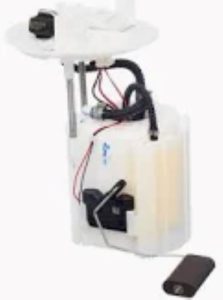Cars use a fuel pump that pushes gasoline from the tank to the engine at an optimal pressure for combustion. To ensure proper fuel flow, most vehicles require the pump to maintain a pressure in the range of 30 to 80 psi. Otherwise, the air-fuel mixture in the combustion chamber would be constantly changing without this stabilized pressure, which can cause other problems such as sputtering, stalling or even the engine not starting. The fuel pump is the heart of your car, and it needs to function well under different driving conditions in order to keep power and performance constant.
Fuel pumps are an essential part in fuel injection systems which has replaced carburetors of modern vehicles to promote better efficiency and more effective emissions control. Fuel injection requires continuous delivery of gasoline; the pump pushes gas at a specific pressure to the fuel injectors. These are the bins into which the injectors atomize fuel and mix it with air to form a proper combustion cocktail. Fuel injection systems are also known to deliver up to 20% more fuel efficiency than older carburetor-based systems as per the Department of Energy, highlighting the importance and significant impact that fuel pumps have on fuel economy.
Since most fuel pumps are placed inside the gas tank, they are rarely exposed to heat and surrounding debris in operation which lengthens their service life to 100k miles or more +. It also keeps fuel line blockages to a minimum and the wear on the pump down. This is because the pump keeps itself cool by being submerged and driving on no fuel can cause it to overheat. Testing has demonstrated that running a fuel pump dry in this manner can reduce the service life of a fuel pump up to 30 percent, prematurely necessitating replacement and increased cost.

… which is when you start feeling the need for a dependable fuel pump, especially in high performance or turbocharged engines where absolute delivery accuracy equals more power. The difference is that high-flow fuel pumps used in most high-performance vehicles take the range beyond stock pressure levels to ensure adequate volume to produce ideal horsepower and torque on a regular basis. According to Performance Garage Mechanic Alex Bishop, “For power levels over a certain point, you just can't run that kind of fuel figure without a high-quality pump.”
Fuel pumps also play a major role in emissions, since fluctuating fuel pressure can result in incomplete combustion and higher levels of hydrocarbons. How the fuel pump helps to reduce emissions: The engine burns less fuel when it is run as efficiently as possible. Defective fuel pumps cause cars to fail emission tests, and release higher levels of carbon monoxide (CO) and hydrocarbons into the environment.
Long term benefits in fuel economy, engine power and emissions can be gained by investing in a good quality fuel pump Fuel Pump or else if you have an original one then keep checking it at regular intervals. From what drivers need to know from their vehicles' fuel system requirements, to those of you accessorizing for your preferred pump with resources designed for specific types of cars that provide the information owners want on model matching plus maintenance & performance enhancements.
